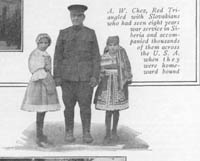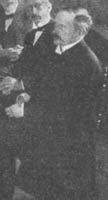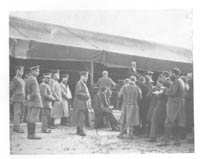Table of Contents
Key Figures
YMCA Secretaries
a | b | c | d | e | f | g | h | j | k | l | m | n-o | p | r | s | t-u | v | w | y-z
Lawson P. Chambers
The son of an American Board missionary, Chambers organized the first American YMCA in Constantinople. In 1908, the International Committee recognized Chambers as an Association secretary in the Ottoman capital, but did not provide financial support. John R. Mott approved Chambers' plan to establish an advisory board to set up a city program. American Association support for Near East began in September 1910 when the International Committee dispatched Ernst O. Jacob to Constantinople as a full time Traveling Secretary for the Levant.
G. A. Champion
A French prisoner of war at Münster in Westphalia, Champion worked with Conrad Hoffman to provide relief services to French POW's in the camp. Champion planned to join the priesthood, but the war intervened and he became actively involved in the YMCA.
Anthony W. Chez
This American YMCA secretary volunteered to serve Allied prisoners of war in Austro-Hungarian POW camps as a WPA Secretary. He arrived in Hungary in September 1916 and worked at Kenyermezö, where he set up a school for illiterate Russian prisoners. The WPA Central Office transferred Chez to Bohemia in February 1917, where he conducted POW relief operations at Brüx and Milowitz. Chez left Austria-Hungary with most of the other American WPA Secretaries in April 1917 when it became clear that the Wilson administration would sever diplomatic relations with the Dual Monarchy. Chez transferred to France where he resumed WPA work for Polish and Czech prisoners of war in Allied propaganda camps and for interned members of the Russian Legion. Chez then traveled to Siberia where he provided relief services for soldiers of the Czechoslovak Legion as they advanced eastwards toward Vladivostok. He accompanied the legionnaires as they crossed the Pacific Ocean and the United States on their return home to the new republic of Czechoslovakia.
Eugene Choisy
A professor at the University of Geneva, Choisy was one of ten members of the Executive Committee of the World's Committee of the World's Alliance of YMCA's during World War I. This committee oversaw Association efforts to provide support for young men at war and supervised the War Prisoners' Aid program across Europe. Choisy attended the April 1918 meeting in Geneva in which John R. Mott addressed a number of important issues that created friction between the World's Alliance and the American YMCA, especially in regard to WPA operations and the activities of Archibald Harte.
Charles Correvon
A Swiss pastor, Correvon became the President of the Geneva Association in 1878. At the Eighth World's Conference, in Geneva the same year, Correvon established his expertise in Bible study. By the early 1890's, Correvon moved to Germany where he became the pastor of the French Church in Frankfurt-am-Main and a naturalized German subject. He attended the Third German Student Conference in August 1892, working with German youth. With the outbreak of World War I, Correvon received a general permit from the Ministry of War to visit prison camps with French Protestants. He conducted a general tour of prison camps with Hermann Rutgers early in the war and proceeded to provide spiritual relief to Allied prisoners of war in prison camps in western Germany. Correvon wrote a book about German prison camps, Aus deutschen Kriegsgefangenenlagern: Eindrücke eines Seelsorges, Dritte Folge, in 1916, which was also translated into French.


